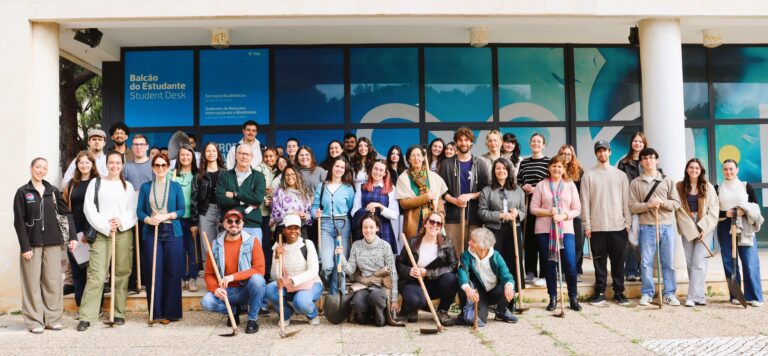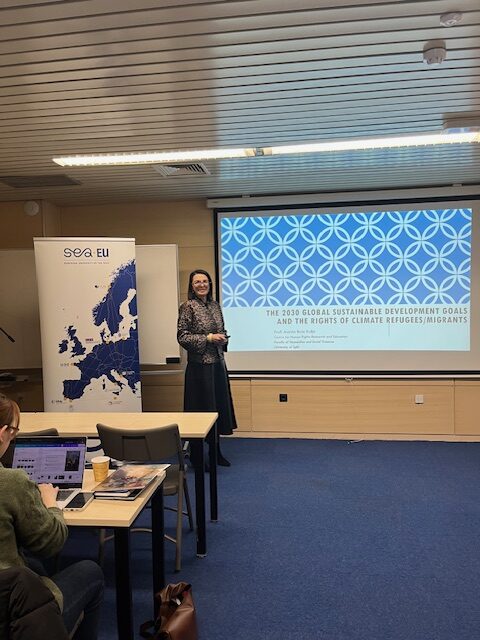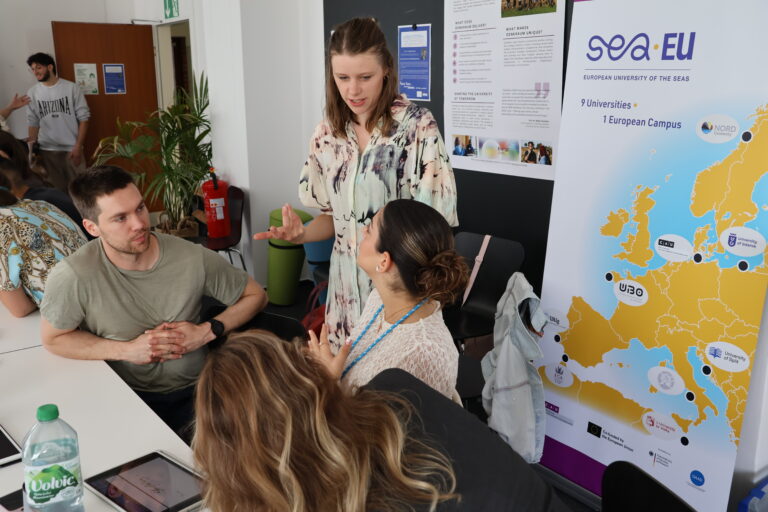Diversity and inclusion are key values of SEA-EU. At Kiel University, Diversity Commissioner Eddi Steinfeldt-Mehrtens, and Lea Raak, responsible for accessibility to higher education, collaborate with colleagues from across the Alliance, together working for more awareness to implement measures to improve everyone’s lives. Here Eddi and Lea talk about their work and why it’s never been more important.
Eddi, what does your work as Diversity Commissioner at Kiel University entail?
ESM: I am responsible for lowering barriers for everyone who experiences racism, sexism, classism, ableism and other types of discrimination. A large part of my work is anti-discrimination counselling for staff members and students. We have more than 100 cases a year, so I have a pretty good overview of what needs to change. Currently we often have to react to events or circumstances, but I really want to flip that dynamic. I think our work would be a lot more effective if we do more preventative work. Therefore, I’m really glad that our Diversity Strategy includes preventive measures, most prominently a prevention concept.
In what ways do think this will be benefit Kiel University?
ESM: I think people are generally want to do the right thing, but if something goes wrong, they sometimes don’t know how to act. So, I think it’s very important to break that cycle. If people have been discriminated against, it will happen again if their supervisor doesn’t know what to do and just, for example, keeps saying completely the wrong thing. Furthermore, I believe a more diversity friendly environment will benefit the whole university – everybody will have a better work and study experience. Some researchers and students may say this topic doesn’t concern them but I think it concerns us all. A case in point is the current rise of fascism in Germany. We can witness how certain stereotypes get weaponized in hateful rhetoric – more anti-bias trai
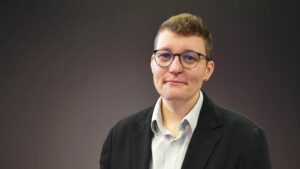
nings can help, for example, to know facts from fake news. Also, greater diversity of staff and students will play a major role in confronting the shortage of skilled workers in Europe.
Inclusion in the German sense of the word refers to creating a world where people with disabilities are not at a disadvantage. Lea, this is something you are focussing on improving at Kiel University. Why do you feel this is so important?
LR: Improving access to education, and accessibility in teaching in all possible ways will mean more people have the opportunity to take part in university life. After all, inclusion is a human right, and yet we still discuss it as if it’s a nice “add-on” or whether or not we should implement certain measures, but really it isn’t up for discussion. Everyone has the right to access education and currently there are plenty of barriers – even before people get to university – consider the barriers to accessing information if you have visual or hearing disabilities. It’s not just about wheelchair access to the seminar rooms, or disabilities that can be seen. I think we, the university, could be a good role model to foster change in our society and culture.
Raising awareness for these topics is central to the work you do. What activities or projects are you working on to do this?
ESM: Every year we organise a week-long programme of events called “Diversity Days” as part of the German initiative Charta der Vielfalt e.V. It’s an opportunity for raising awareness, but also for further education for staff and students. And I think it works really well. What we do specifically here is to collaborate with other universities in and around Kiel. I don’t know of any other university in Germany that does that. Kiel is not a large city, so it makes sense not to compete for audiences and instead share our resources. I think this is great, and it’s good practice – after all, in the field of diversity we all have the same goal. We want to make everything more diversity friendly, not just our own organisations.
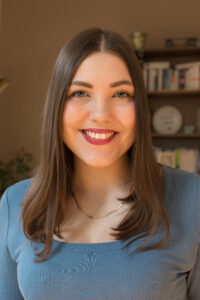
LR: We are also working on an action plan to implement the UN Convention on the Rights of Persons with Disabilities (UN-CRPD). A big topic here is digital accessibility. Concrete measures include a webpage where all information about projects supporting accessibility and inclusion across the university will be available. We also need to make documents accessible for screen readers etc. In December, we will officially present the action plan in a large event. This will be an opportunity to discuss accessibility at the university. The event will be open to all University members and will also include participants from the ministry and State of Schleswig Holstein. It would be great if events like these bring us closer to mainstreaming disability – i.e. everyone thinks about accessibility when they implement something. Even more importantly, these events should amplify the voices of people with disabilities and chronic illnesses.
You also work with colleagues from across the SEA-EU Alliance. How have these exchanges influenced your work here in Kiel?
ESM: I visited our Norwegian partners university in Bodø and got to know their work particularly on the issues of cultivating a more queer-friendly campus. They started a small project there and invited me as a trans-person working in the field of diversity to contribute. We also exchanged diversity strategies so we might implement some of each other’s goals and measures. I think this sort of exchange really benefits the diversity work overall. Generally, I think it’s really great to work together on a European level, because we can only solve diversity issues, climate issues, and so on, on the European and not on the national level. That’s my conviction.
LR: I represent Kiel University in the SEA-EU inclusion group. Last year we invited students from Malta to join us online on the International Day for the Rights of people with Disabilities. They all live with a disability or chronic illness and we had a panel discussion about campus accessibility as part of the Inclusion Week we organised. It was an extremely interesting discussion, especially hearing them talk about the language around disability. Language and terminology are important if we want to talk about disability and diversity to raise awareness. In the autumn this year, disability studies researchers from the University of Malta will visit Kiel for another exchange; they are interested in meeting members from our Institute for Inclusive Education. This is actually a unique institution in Germany. The education specialists there are people who have previously worked in a workshop for people with disabilities (WfbM) and have completed a full-time qualification. As qualified education specialists, they provide the CAU community with practical knowledge about inclusion.
Have the exchanges you’ve had on an international level made you aware of differences, or commonalities, across Europe?
LR: Speaking with the students from Malta last year, it became clear we are all fighting against the same issues, with similar goals and perspectives. It is empowering, but can also be frustrating. Even across Germany, however, there are differences since some states have more money and resources for implementing measures than others do.
ESM: Generally, I think we share the problems in that we often don’t have the resources to do the work we want to do. Also, I think nearly everybody who works in the field of diversity, inclusion and equality is really scared about the rise of fascism in Europe. That’s something we’ve talked about a lot. It is paradoxically frightening but also empowering to see that we all have the same fears and but that we can, and will, work together on this.
